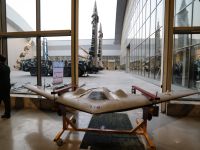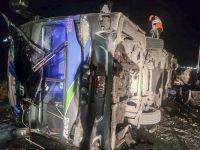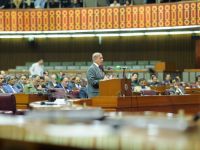The killing of more than 600 wild horses, shot from a helicopter with semi-automatic rifles, has sparked outrage in Australia with demands Sunday that the controversial practice be banned.
The National Parks and Wildlife Service (NPWS) insist the cull was conducted as humanely as possible but community and animal welfare groups are not convinced.
The horses, or brumbies as they are known in Australia, were shot from two helicopters during a three-day operation late last month amid fears that the horses, an introduced species, were damaging the environment and threatening native flora and fauna.
Two accredited NPWS marksmen discharged 3,000 bullets from semi-automatic rifles into the herd on an escarpment in the Guy Fawkes River National Park on the mid-north coast of New South Wales state.
"I have had reports of foaling mares being shot, of horses having their legs shot out from them, ponies shot through the jaw and others horses wounded by several bullets with considerable time elapsing before NPWS staff returned to put them out of their suffering," said Andrew Fraser, MP for area.
One horse was found alive with two bullet wounds almost a fortnight after the cull. Other carcasses were discovered with up to 16 bullet wounds.
The Australian Horse Alliance, which revealed the slaughter, called the method used "the cruelest and laziest possible".
"They drove the horses up against an escarpment with the helicopter then sprayed bullets to stop them getting away," said alliance member Chris Hodgson.
Helicopter pilot Peter Elliot said: "It was horrible work and nobody wanted to be doing it."
NSW Environment Minister Bob Debus said a review into the culling of brumbies in national parks was underway, declaring he could not condone "inhumane" treatment of animals.
The RSPCA is also conducting an investigation.
A third inquiry is being carried out by protest group Animal Liberation which is seeking to prosecute the NPWS under the Prevention of Cruelty to Animals Act.
"Under the Act they have to show the killing is 'justifiable, necessary and reasonable', said the organization’s NSW president Mark Pearson. "Our number one demand is for a ban on aerial culls" -- SYDNEY (AFP)
© 2000 Al Bawaba (www.albawaba.com)







